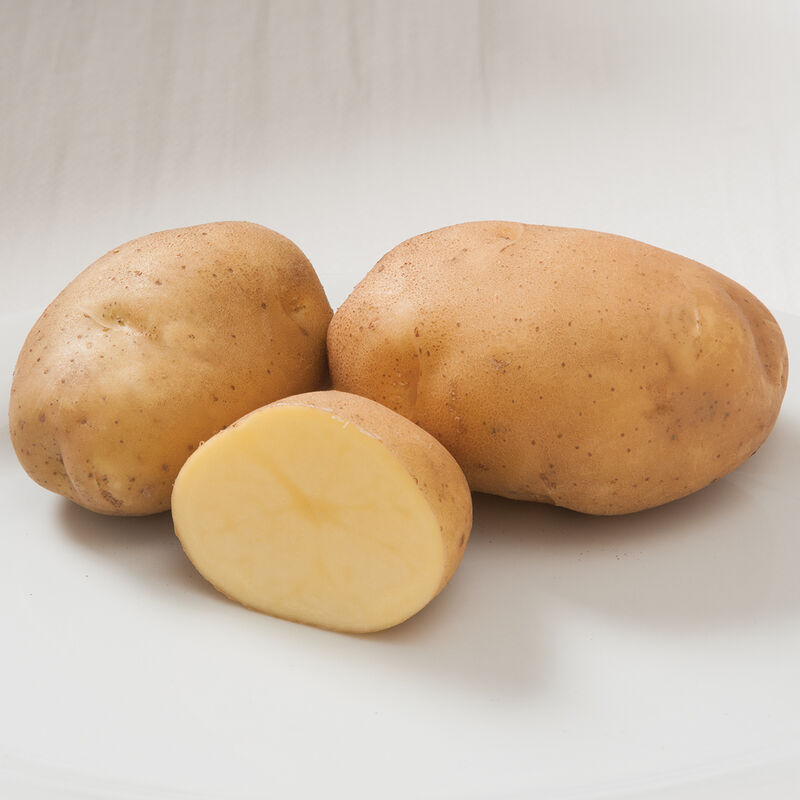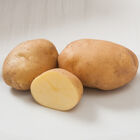Satina Organic Seed Potatoes
Satina Organic Seed Potatoes
Yellow skin, yellow flesh, gourmet flavor.
Always a favorite on our Research Farm. Silky smooth and buttery for mouth-watering mashed potatoes. Produces high yields with few culls. Stores well. Certified Seed Potato. USDA Certified Organic.Disease Resistance:
- This product does not ship to Canada.
- This product does not ship to the following countries: United Arab Emirates, Austria, Australia, Barbados, Belgium, Bulgaria, Bermuda, Bahamas, Switzerland, Cyprus, Czech Republic, Germany, Denmark, Estonia, Spain, Finland, France, United Kingdom, Greece, Hong Kong, Croatia, Hungary, Ireland, Iceland, Italy, Japan, Republic of Korea, Kuwait, Cayman Islands, Lithuania, Luxembourg, Latvia, Malta, Netherlands, Norway, New Zealand, Oman, Poland, Portugal, Qatar, Romania, Saudi Arabia, Sweden, Singapore, Slovenia, Slovakia, San Marino, Thailand, Trinidad and Tobago, Taiwan, Ukraine.
- This product does not ship to the following states and jurisdictions: AA, AE, AK, AP, AS, FM, GU, HI, MH, MP, PR, PW, VI.
Potatoes ship from late March through early April. 25 lb. and 50 lb. sizes ship via ground transportation and require a physical address for delivery (no P.O. Boxes). 5 lb. sizes can ship to a P.O. box.
SCIENTIFIC NAME:
Solanum tuberosumCULTURE:
Potatoes grow best in well-drained, fertile soil with a pH of 6.0-7.0. Cut tubers into pieces roughly 1 1/2-2 oz. (1-1 1/4" diameter) each, with at least one "eye" per piece. Small tubers may be planted whole. Potatoes can be planted in early to midspring as they tolerate cool soil and moderate frost. Plant seed pieces 2-3" deep, 12" apart, in rows 30-36" apart. Plants will emerge 2-3 weeks later. When the plants are 6-8" tall, hill them by mounding soil from each side of the row about 4" high along the base of the plants to protect developing tubers from greening. Repeat hilling process as plants grow until hills are about 12" high.AVG. PLANTING RATE:
10 lb./80-100' at 12" spacing; 110 lb./1,000'; 1,600 lb./acre in rows 36" apart.INSECT PESTS:
Row covers work well to exclude insect pests such as Colorado potato beetles, aphids, and leafhoppers. Otherwise, scout for yellow-orange potato beetle eggs on undersides of leaves and crush them; manually remove and dispose of larvae and adults. Potato beetles can also be controlled with a spinosad insecticide.DISEASE:
The best disease control is fertile soil, crop rotation, and consistent moisture.HARVEST:
Small, "new" potatoes can be harvested beginning about 7-8 weeks after planting. After foliage has died back, leave main crop tubers in the ground for 2 weeks to set skin. Dig tubers, brush off soil, and allow skins to dry before storing. Store in a cool but not freezing 40°F (4.4°C) dark, humid place.SPECS:
Avg. 8-10 pieces/lb.; fingerling type: avg. 20 pieces/lb.Johnny's is committed to your success, every step of the way.
We want you, our customer, to be 100% satisfied with all of our seeds, tools, and supplies.
If anything you purchase from us proves unsatisfactory, we will either replace the item or refund the purchase price.





